With the rise of mobile devices and location-based searches, optimizing local searches has become more important. While global SEO can help improve your website's visibility on a broader scale, local SEO is equally important for businesses that rely on local customers. By leveraging local SEO strategies, businesses can improve their visibility, increase website traffic, and drive more sales.
However, optimizing for local search can be daunting, especially for starting businesses. From optimizing your Google My Business listing to building local citations, there are several best practices that businesses need to follow to improve their local SEO rankings.
In this article, we'll explore the Local SEO benefits, dive into the best practices, analyze more about Local SEO services and provide tips to help businesses get started with their local SEO strategies. Whether you're a small business owner or a digital marketer, this article will provide valuable insights into the importance of local SEO for your business.
Looking for Best Local SEO Services?
- Capture Better Market Share
- Reach the Desired Audience
- Accelerate your Return on Investment
What is Local SEO And Why Do You Need It?
Local SEO, or Local Search Engine Optimization, is a digital marketing strategy that aims to optimize a business's online presence for local search queries. It involves optimizing a business's website, Google My Business listing, and other online assets to appear higher in the search engine results pages (SERPs) when users search for products or services within a specific geographic location.
The need for local SEO arises because people increasingly rely on the internet to find local businesses.
According to a study, 97% of people search online for a local business, and 46% of all Google searches are local. Furthermore, most local searches result in a purchase, with 72% of consumers visiting a store within five miles of their current location.
By optimizing for local search, businesses can increase their visibility among potential customers in their local area, drive more traffic to their website and physical location, and ultimately, increase sales. Local SEO is essential for small and medium-sized businesses that rely on foot traffic or local customers to drive sales.
Have a look at the image below, where JanBask is ranking well on the search engine in Alexandria due to robust local SEO and content strategy.
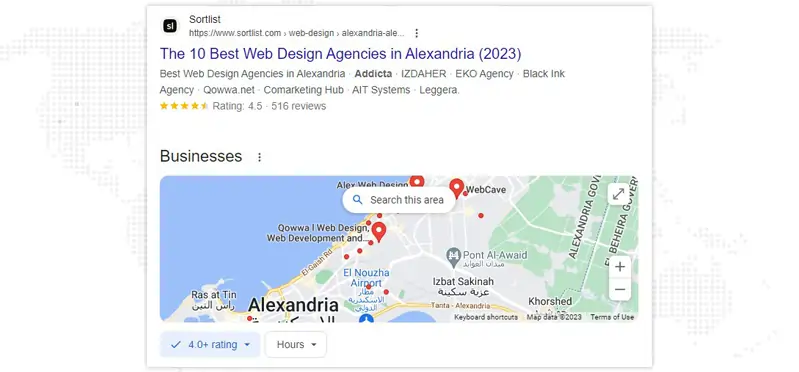
So, how does Local Search Engine Optimization work? Here are some key components:
- Google My Business: This is a free tool provided by Google that allows businesses to create a profile that appears in Google Maps and the Local Pack (the top three local results that appear above the organic search results).
- On-page optimization: This involves optimizing the content and metadata of your website for local search queries. This includes adding location-specific keywords, optimizing title tags and meta descriptions, and creating location-based content.
- Local citations: These are mentions of your business on other websites, such as directories, review sites, and social media platforms. Having consistent and accurate information across these platforms helps to improve your local SEO rankings.
- Online reviews: Positive customer reviews can help improve your business's visibility in local search results. Encouraging customers to leave reviews on Google My Business, Yelp, and other review sites is critical to local SEO.
Local Search Engine Optimization is essential for businesses that want to increase their visibility among local customers. By optimizing for local search queries, businesses can drive more traffic to their website and physical location, increase sales, and, ultimately, grow their business.
How Does Google Determine Local Ranking?
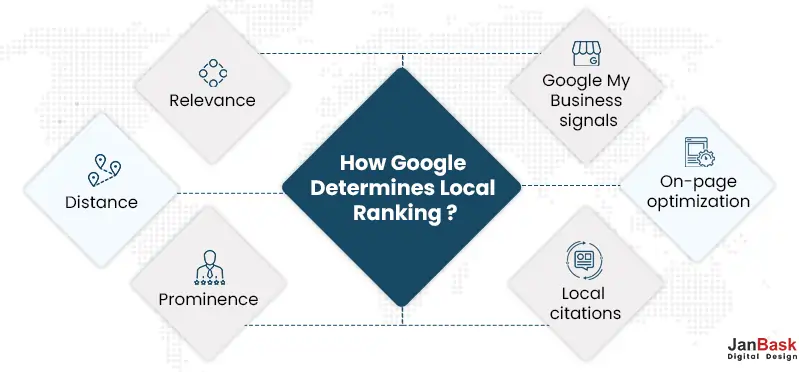
Google's local ranking algorithm uses complex factors to determine which businesses appear at the top of local search results. While Google's exact algorithm is not publicly disclosed, several known factors influence local ranking. Here are some key components:
- Relevance: Google's algorithm considers the significance of a business to the user's search query. This involves analyzing the business's website content, Google My Business profile, and other online assets to determine how well they match the user's search intent.
- Distance: The proximity of the business to the user's location is another critical factor. Google uses GPS data, IP addresses, and other location signals to determine the user's location and show them the most relevant businesses nearby.
- Prominence: This factor is based on the popularity and reputation of the business online. Google looks at factors such as the number of reviews, the quality of those reviews, the business's overall online presence, and the number of links pointing to the business's website.
- Google My Business signals: Google receives these signals from the business's Google My Business profile. This includes the completeness of the profile, the accuracy and consistency of the business's name, address, and phone number (NAP), the number of reviews, the quality of those reviews, and the business's proximity to the user's location.
- On-page optimization: This involves optimizing the content and metadata of the business's website for local search queries. This includes adding location-specific keywords, optimizing title tags and meta descriptions, and creating location-based content.
- Local citations: Google monitors the number and quality of local sources that mention the business's name, address, and phone number. This includes citations from online directories, review sites, and other local businesses.
It's worth noting that Google's algorithm is constantly evolving, and the importance of each factor can vary depending on the search query and the user's location. However, by focusing on these critical components, businesses can improve their local ranking and increase their visibility among local customers.
Tips on Improving Your Local Rankings
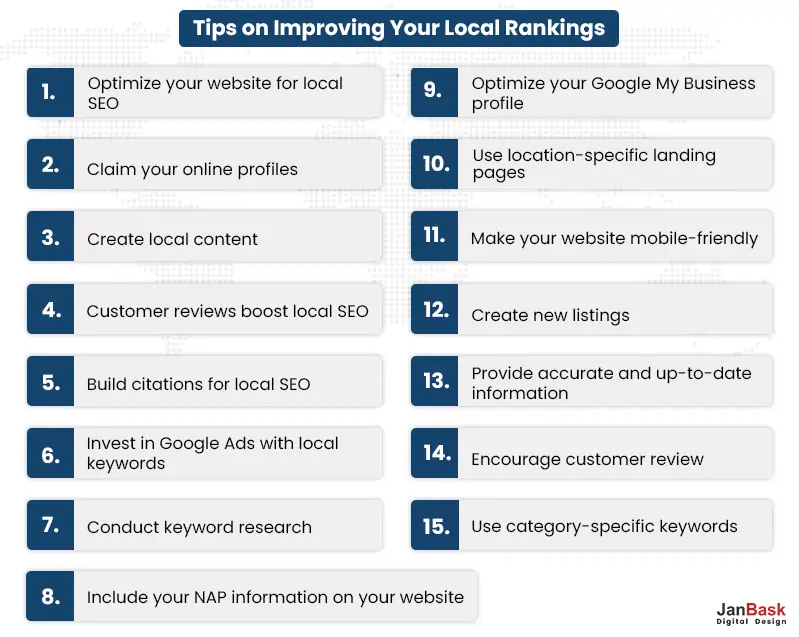
- Optimize your website for local SEO: This involves optimizing your website's content and metadata for local search queries. This includes adding location-specific keywords, optimizing title tags and meta descriptions, and creating location-based content. Additionally, ensure your website is mobile-friendly and has a fast loading speed, as this can also impact your local ranking.
- Claim your online profiles: Claim your business on Google My Business, Yelp, and other relevant directories. Ensure that your NAP (name, address, and phone number) is consistent across all platforms and that your profiles have photos, hours, and other relevant information.
- Create local content: Create content relevant to your local audience, such as blog posts, videos, and social media posts. This helps establish your business as an authority in your local area and improve your local SEO.
- Customer reviews boost local SEO: Encourage your customers to leave reviews on Google My Business, Yelp, and other relevant review sites. Positive reviews can help to improve your local ranking and attract more customers to your business.
- Build citations for local SEO: Citations are mentions of your business on other websites, such as directories, review sites, and social media platforms. Having consistent and accurate information across these platforms helps to improve your Local Search Engine Optimization rankings.
- Invest in Google Ads with local keywords: Investing in Google Ads can be a highly effective way to improve your local rankings. By targeting local keywords and using location-based targeting, you can reach customers in your local area and increase your visibility in local search results.
- Conduct keyword research: Use keyword research tools such as Google Keyword Planner to identify local keywords your potential customers are searching for. Include these keywords in your website's content and metadata, such as title tags, meta descriptions, and header tags.
- Include your NAP information on your website: NAP stands for name, address, and phone number. Ensure your NAP information is prominently displayed on your website, preferably in the footer or header of every page. This helps search engines to associate your website with your physical location and improves your local ranking.
- Optimize your Google My Business profile: Google My Business is a tool that comes at no cost and empowers you to regulate how your business appears on Google's platforms such as Google Maps and Google Search. It is vital to ensure that your Google My Business profile is comprehensive and current, with all necessary information such as NAP, operational hours, and photographs.
- Use location-specific landing pages: If your business serves multiple locations, create location-specific landing pages for each location. Ensure each landing page includes location-specific keywords, NAP information, and other relevant details about that location.
- Make your website mobile-friendly: More and more people are using their mobile devices to search for local businesses. Make sure that your website is mobile-friendly and has a fast loading speed. This can improve your local ranking and provide a better user experience for your potential customers.
- Create new listings: Create a new listing if your business is not listed on a particular search engine or directory. This can be done by providing basic information such as your business name, address, phone number, website, and hours of operation.
- Provide accurate and up-to-date information: Make sure your online profiles are complete with accurate and up-to-date information about your business, including your hours of operation, website, and services. This can improve your local rankings and attract more customers to your business.
- Encourage customer reviews: Encourage your customers to leave reviews on your online profiles, which can help improve your local rankings. Respond to all positive and negative reviews to show that you value customer feedback and are committed to providing excellent service.
- Use category-specific keywords: Use category-specific keywords in your business description and profile tags. This can help to improve your local rankings for specific keywords that potential customers are searching for.
What are the Benefits of Local SEO?
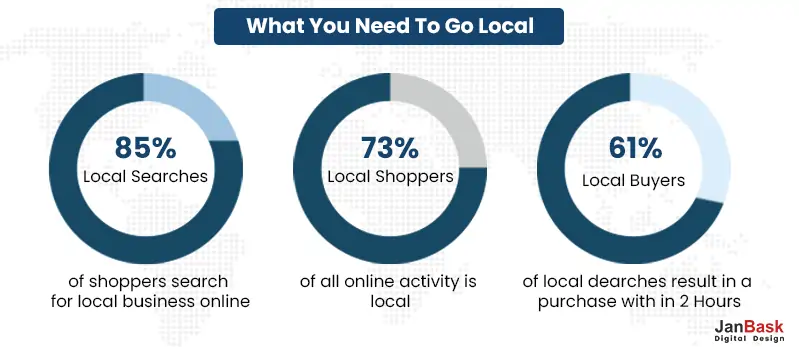
There are several benefits of local search marketing that operate in specific geographic areas. Here are some of the critical Local SEO benefits:
- High positions for local queries: Optimizing your website and online profiles for local search queries can achieve high rankings in search engine results pages (SERPs) for questions related to your products or services in your specific geographic area. This can increase your visibility and attract more potential customers to your business.
- Improved visibility in your niche: Local Search Engine Optimization can help you stand out by appearing at the top of search results for specific queries related to your products or services in your local area. This can increase your brand awareness and attract more customers to your business.
- Increased relevant traffic: Local SEO can help attract more relevant traffic to your website by targeting people searching for products or services in your local area. This can increase the chances of converting visitors into customers.
- Enhanced trust and authority: Optimizing your online profiles and providing accurate, up-to-date information about your business can build trust and authority with potential customers. This helps establish your business as a credible and reliable source of information, products, or services in your local area.
- Strong local community outreach: Local SEO can help you to connect with your local community by promoting your business in local directories, online maps, and social media platforms. This can help to build relationships with other local businesses and organizations and create opportunities for partnerships, sponsorships, or collaborations.
- More effective marketing campaigns: Local SEO allows businesses to focus on specific geographic areas, making their marketing campaigns more effective. Businesses can achieve higher engagement rates and better ROI by targeting their campaigns to the right audience.
- Cheaper ads: Local Search Engine Optimization can also help businesses save money on advertising costs. Businesses can run more targeted ads that are less expensive than broader campaigns by focusing on local audiences. This can be especially helpful for small businesses with limited marketing budgets.
- Exposure in local listings: Local SEO can help businesses gain exposure in local listings such as Google My Business, Yelp, and other directories. This can help potential customers find your business quickly and easily, even if they need to search for it by name actively.
- Appearance in Google's 3-pack: Google's 3-pack is a highly coveted spot on the first page of search results for local queries. Optimizing your online profiles for local SEO can increase your chances of appearing in the 3-pack, significantly increasing your visibility and attracting more customers to your business.
- Fresh local reviews: Reviews are critical in local SEO, as they provide social proof and can help improve your rankings. By encouraging customers to leave reviews on your online profiles, you can ensure that your business has a steady stream of fresh, relevant reviews that can help attract more customers to your business.
- Increased sales revenue: Local SEO can help businesses attract more customers in their local area, and improve brand awareness, leading to increased sales revenue. By optimizing their online presence for local search queries, businesses can increase their visibility and attract more potential customers to their website or physical location.
- CRO: Conversion rate optimization (CRO) is essential to local SEO. CRO focuses on increasing the percentage of website visitors who take a desired action, such as filling out a contact form or purchasing. By improving your conversion rate, you can get more value from your existing traffic and boost your return on investment (ROI).
- Increased number of repeat customers: By building a robust online presence and providing a positive customer experience, businesses can encourage customers to return and make repeat purchases. This can increase customer loyalty and lifetime value, significantly impacting sales revenue.
- Ability to build a community: Local Search Engine Optimization can also help businesses build a sense of community around their brand. By engaging with customers on social media and local forums, businesses can build relationships with customers and create a loyal fanbase that will support their business over time.
- Being head above the competition: With more and more businesses moving online, competition is becoming increasingly fierce. Local SEO can help businesses stand out by appearing at the top of search results for local queries and providing customers with a superior online experience.
- Gain loyal customers: By optimizing their online presence for local SEO, businesses can attract and retain loyal customers who are more likely to refer their friends and family to the business. This can increase brand awareness and drive new business through word-of-mouth referrals.
- Link building with other local businesses: One of the key local SEO strategies is building relationships with other local businesses. By networking with other businesses in your area, you can create valuable links to your website, which can help to improve your search engine rankings and drive more traffic to your site.
- Focusing on mobile devices: With more and more consumers using mobile devices to search for local businesses, businesses need to focus on mobile optimization in their local SEO strategies. By ensuring that your website is optimized for mobile devices, you can provide a better user experience for your customers and attract more mobile traffic.
- Boosting your ROI: Local Search Engine Optimization can be a highly effective way to increase your return on investment (ROI) by targeting customers more likely to convert. Optimizing your website for local search queries can attract more qualified leads who are more likely to purchase or visit your physical location, resulting in higher sales revenue and a better ROI.
- Strong CTAs: In local SEO, a strong call-to-action (CTA) is essential for converting website visitors into customers. A CTA prompts the user to take a specific action, such as filling out a contact form, calling a phone number, or visiting your business in person. To make your CTA effective, it should be clear, concise, and visually prominent on your website. Use action-oriented language that clearly communicates the benefit to the user. For example, instead of saying, "Contact us," say, "Schedule a free consultation today!"
Tailoring your CTA to your audience is essential. If you're a restaurant, your CTA might encourage users to make reservations or order online for takeout. In addition to website CTAs, you can include a CTA in your Google My Business profile. This could be like "Call now to book your appointment or Order online for quick pickup."
Local SEO For Small Businesses
Local SEO is essential for small businesses to improve their online visibility and attract more local customers. By optimizing their website and online presence for local search queries, small businesses can improve their search engine rankings, increase their visibility in local search results, and attract more qualified leads to their website or physical location. Here are some critical tips for Local SEO for small businesses:
- Check for technical errors that could impact indexing: One of the first steps in local SEO strategies is to ensure that your website is technically sound and free from any mistakes that could impact indexing by search engines. This includes checking for broken links, optimizing your website's structure and metadata, and ensuring your website is mobile-friendly and responsive.
- Create fantastic content: Creating high-quality, engaging content is essential for any successful Local Search Engine Optimization strategy. Creating content that resonates with your target audience and incorporates relevant local keywords can improve your search engine rankings and attract more qualified traffic to your website.
- Incorporate local link building into your SEO strategy: Link building is essential to any successful SEO strategy. Local businesses should focus on building relationships with other local businesses and organizations in their community. This can include guest blogging, sponsoring local events, and collaborating with other businesses to create valuable content and backlinks.
- Get Your Google Business Profile in Order: Google My Business (GMB) is a free tool that allows small businesses to manage their online presence across Google, including search and maps. To optimize your GMB profile, ensure all your business information is up-to-date, including your address, phone number, and hours of operation. You should also add photos of your business, respond to customer reviews, and encourage customers to leave reviews.
- Ensure Local Listings are Accurate: Local listings are directories that list local businesses, such as Yelp, Yellow Pages, and Bing Places. To improve your local SEO, ensure your business information is accurate and consistent across all local directories. This includes your business name, address, phone number, and website. Inconsistent or incorrect information can negatively impact your local SEO and confuse potential customers.
- Monitor & Respond to Local Reviews: Reviews are an essential factor in local SEO, as they can influence a customer's decision to visit or purchase from your business. To improve your Local Search Engine Optimization, monitor and respond to all local reviews, whether positive or negative. Responding to negative reviews can demonstrate your commitment to customer service and improve your online reputation. Positive reviews can also be used in your marketing materials and social media.
Some Local SEO Tools
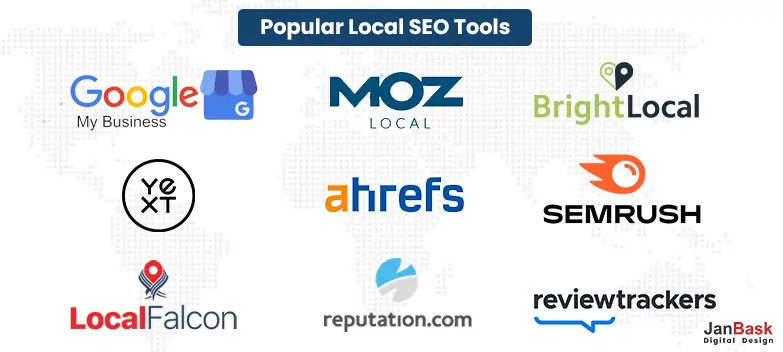
Local SEO is a highly effective way to improve your online visibility and attract more customers to your business. However, managing all the different aspects of your local SEO strategy can be challenging without the right tools. Fortunately, many local SEO tools can help you optimize your website, monitor your local search rankings, and tracbk your online reputation. Here are some of the most popular local SEO tools and how they can benefit your business:
- Google My Business: Google My Business (GMB) is a free tool that allows businesses to manage their online presence across Google, including search and maps. With GMB, you can update your business information, add photos, respond to customer reviews, and track your online performance.
- Moz Local: Moz Local is a local SEO tool that helps businesses manage their online listings and monitor their local search rankings. With Moz Local, you can update your business information across multiple directories, watch your online reviews, and track your local search rankings.
- BrightLocal: BrightLocal is a Local Search Engine Optimization tool that offers a wide range of features to help businesses improve their online visibility. With BrightLocal, you can manage your online listings, track your local search rankings, monitor your online reputation, and generate more customer reviews.
- Yext: Yext is a local SEO tool that allows businesses to manage their online listings across multiple directories, including Google, Facebook, and Yelp. With Yext, you can update your business information, track your online reviews, and monitor your local search rankings.
- Ahrefs: Ahrefs is a powerful SEO tool that offers many features to help businesses improve their online visibility. With Ahrefs, you can track your search rankings, analyze your competitors, and identify new link-building opportunities.
- SEMrush: SEMrush is another powerful SEO tool that offers many features to help businesses improve their online visibility. With SEMrush, you can track your search rankings, analyze your competitors, and identify new keyword opportunities.
- Whitespark: Whitespark is a local SEO tool that offers a range of features to help businesses manage their online listings and monitor their local search rankings. With Whitespark, businesses can track search rankings, find new citation opportunities, and manage online reviews.
- Local Falcon: Local Falcon is a Local Search Engine Optimization tool that allows businesses to track their search rankings at the hyperlocal level. With Local Falcon, businesses can see how their business appears in search results across different locations and improve their online presence in specific areas.
- Reputation.com: Reputation.com is an online reputation management tool that helps businesses monitor and improve their online reputation. With Reputation.com, businesses can track their online reviews, respond to customer feedback, and generate more positive reviews from satisfied customers.
- ReviewTrackers: ReviewTrackers is a management tool that allows businesses to monitor and respond to customer reviews across multiple platforms. With ReviewTrackers, businesses can track their online reviews, identify trends in customer feedback, and improve their online reputation.
Improve Your Business Visibility with Local SEO
In today's competitive digital marketplace, businesses must have a robust online presence to attract and retain customers. Local SEO is an effective way for businesses to improve their online visibility and attract local customers. Optimizing your website and online profiles for local search can improve your search rankings and reach more potential customers in your area.
One SEO Company that specializes in local SEO is JanBask. JanBask is a leading provider of digital marketing and SEO services for businesses of all sizes. With a team of experienced SEO professionals, JanBask can help businesses improve their online visibility and attract more customers through local searches.
JanBask's local SEO services include optimizing business listings, creating local content, and building local citations. By optimizing your online profiles for local search, JanBask can help your business rank higher in local search results, attract more customers, and increase your revenue.
One of the key benefits of JanBask's local SEO services is that they are tailored to each client's unique needs and goals. Whether you're a small business looking to improve your online visibility or a large corporation looking to dominate local search, JanBask has the expertise and experience to help you achieve your goals.
In addition to local SEO, this SEO Company offers various digital marketing services, including social media marketing, PPC advertising, and content marketing. With a comprehensive approach to digital marketing, JanBask can help businesses achieve their online goals and stay ahead of the competition.
To improve your business's online visibility and attract more local customers, consider partnering with JanBask for your local SEO and digital marketing needs. With a proven track record of success and a commitment to delivering results, JanBask SEO Services company can help your business achieve its full potential in the digital marketplace.
Conclusion
Local SEO is an essential component of any successful digital marketing strategy. Optimizing your website and online profiles for local search can improve your business's visibility and attract more customers in your local community. Whether you're a small business owner or a large corporation, investing in Local Search Engine Optimization can help you stand out from the competition and achieve greater success in your local market.
From claiming and optimizing your online profiles to creating local content and building citations and links, businesses can implement various best practices to improve their local SEO. By leveraging the power of local search and incorporating these best practices into your marketing strategy, you can establish your business as a trusted authority in your local community and attract more customers than ever before.
Overall, the Local SEO benefits are clear. Increased visibility, more effective marketing campaigns, and higher sales revenue are advantages businesses can enjoy by optimizing their online presence for local search. So if you want to improve your business's visibility and attract more customers in your local market, now is the time to invest in local SEO and reap the benefits for years.
Interested in our Local SEO Services?
- Improved visibility in your niche
- Exposure in local listings
- Gain loyal customers
FAQs
1. What is local SEO?
Local SEO optimizes your online presence to improve your visibility and rankings in local search results. This involves optimizing your website, online profiles, and other digital assets to target local customers and attract more business from your local community.
2. Why is local SEO important for businesses?
Local SEO is essential for businesses because it helps them attract more customers in their local market. By optimizing their online presence for local search, businesses can improve their visibility, attract more relevant traffic, and increase sales revenue.
3. How does Google determine local rankings?
Google determines local rankings based on various factors, including relevance, distance, and prominence. Optimizing your website and online profiles for local search can improve your chances of ranking higher in local search results.
4. What are the best practices for local SEO?
Some best practices for local SEO include optimizing your website for local search, claiming and optimizing your online profiles, creating local content, building citations and links, and monitoring and responding to local reviews.
5. How can I improve my local rankings?
To improve your local rankings, you can optimize your website and online profiles for local search, create high-quality local content, build citations and links, and engage with your local community through social media and other channels.
6. How critical are customer reviews for local SEO?
Customer reviews are essential for local SEO because they help establish your business's reputation and authority in your local market. Positive reviews can also help improve your rankings in local search results.
7. What are the benefits of local SEO?
The Local SEO benefits include increased visibility, more effective marketing campaigns, cheaper ads, exposure in local listings, appearance in Google's 3-pack, new local reviews, increased sales revenue, increased number of repeat customers, ability to build a community, being head above the competition, and gaining loyal customers.
8. What are some local SEO tools that businesses can use?
Some local SEO tools businesses can use include Google My Business, Moz Local, Yext, BrightLocal, and SEMrush.
9. How can I measure the success of my local SEO efforts?
You can measure the success of your local SEO efforts by tracking your rankings in local search results, monitoring traffic to your website and online profiles, and tracking your sales revenue and customer engagement metrics.
10. Can local SEO benefit all types of businesses?
Yes, local SEO can benefit all types of businesses, from small local businesses to large multinational corporations. Optimizing your online presence for local search can improve your visibility and attract more customers in your local market, regardless of the size or scope of your business.








A
Wow, I had no idea local SEO could have such a big impact on my small business. Thank you for breaking down the benefits and best practices so clearly!
A
I’ve been struggling to improve my local rankings, but this article has given me some great tips to try out.
S
As a consumer, I definitely trust businesses with positive reviews and strong local community outreach. This article has helped me understand why that’s so important for small businesses.
G
I appreciate the emphasis on creating high-quality content for local SEO. It’s not just about stuffing keywords in your website!
M
I never realized how important it is to claim my online profiles. I’ll definitely be doing that ASAP.
T
The section on monitoring and responding to local reviews is especially helpful. I’ll be sure to implement those tips in my own business.
T
I’ve been hesitant to invest in Google Ads, but after reading this article, I can see how using local keywords could be a game-changer for my business.
R
I’m glad the article mentioned the importance of mobile optimization for local SEO. So many people use their phones to search for local businesses these days!
K
I didn’t realize there were so many tools available to help with local SEO. I’ll be checking those out.
R
This article has convinced me that local SEO is essential for my business’s success. Thank you for the valuable information and advice!